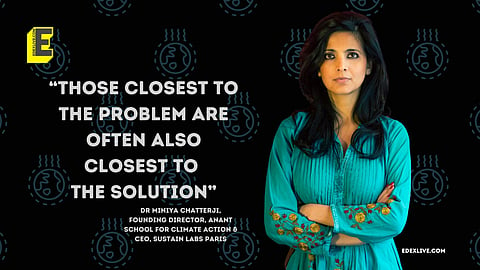Climate change is real and so is climate anxiety among youngsters. Expert answers pertinent questions on both
Many young people are anxious about climate change. Is this anxiety justified? What are the scientific realities of climate change and its potential impacts?
Anxiety, of course, is never justified. Instead, a solutions-oriented mindset is more constructive.
Scientific evidence does suggest that climate change is real and is primarily caused by human activities, which leads to extreme weather events, rising sea levels, food security issues, and loss of biodiversity. These changes, if not addressed by solutions — not anxiety — can significantly disrupt lives especially of the most vulnerable, entire ecosystems, and economies.
There are people who are working on solutions to reduce emissions and mitigate impacts; and as the scope widens, I believe there will be a number of youngsters in the future who will be working on climate technologies to serve this cause.
What are some of the promising solutions being developed to address climate change?
Pro-climate regulations and policies are shaping the shift in climate action from being something that industries used to once consider ‘nice to do’ to now ‘needing to do’.
Carbon capture and storage (CCS) technologies are being developed to remove CO2 emissions from industries. Innovations in electric vehicles (EVs) and public transportation are reducing emissions from the transportation sector.
Policies promoting energy efficiency, reforestation, and reducing emissions are playing a role in the way nations and industries are operating.
Renewable energy sources, such as solar, wind, and hydropower, are rapidly advancing and becoming more cost-effective, reducing reliance on fossil fuels. Energy storage technologies, like advanced batteries, are improving grid reliability and facilitating the integration of renewables.
How big of a role does education play in order to empower individuals to become effective changemakers and navigate the complexities of climate change?
The primary role of education is to instill the ability to open mindedly understand others’ perspectives.
Changemakers — for climate and other causes — need to be ‘on the bridge’ of one hand truly understanding the point of view of those who need to change and taking them along, while also being steadfast on the direction of change.
It is, therefore, important to not alienate the polluters or pockets of society and economy who are damaging the ecosystem around us, or else they will close the doors of communication to us.
Education teaches us to understand their point of view and hopefully tactfully work through the complexities with them. Those closest to the problem are often also closest to the solution.
How can we advocate for stronger climate policies on a local, national, and international level?
At the helm of climate policies for India, we are fortunate to have a strong and admirable leader who has emerged from and, therefore, understands the grassroots.
India’s Minister for Environment, Forestry, and Climate Change Bhupender Yadav continues with the portfolio for the second term, thus, offering continuity to the various climate related programmes that are ongoing and in the pipeline for India.
As is the case in the European Union, Canada and Australia — countries that are carving out bold and authentic climate related policies and regulations, India’s climate policy makers can also work together with climate technical specialists, academia, and grassroot organisations and individuals, so that India’s climate related policies too are authentic enough to work to protect the many competing basic needs of our people — air, water, food, livelihoods.



